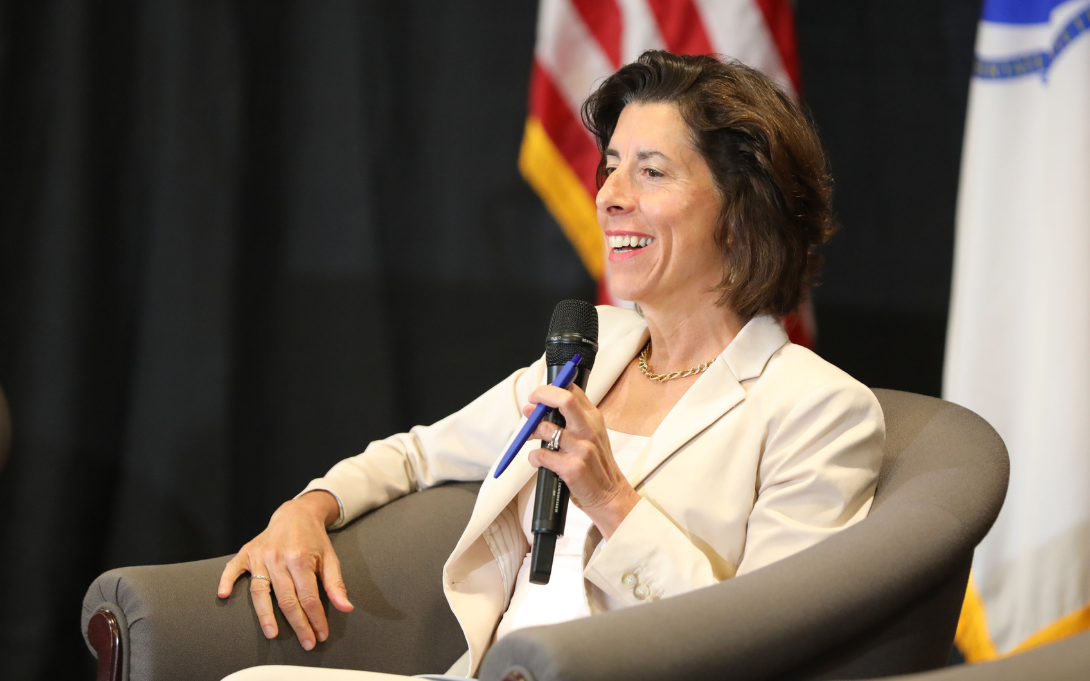US Secretary of Commerce Gina M. Raimondo visited the Ford School of Public Policy on September 22 as part of the Policy Talks @ the Ford School series.
In a discussion with Professor Betsey Stevenson, Raimondo addressed climate change, economic competition with China, education, national security, protectionism, the semiconductor sector, and the state of American manufacturing.
Raimondo drew on her experience as governor of Rhode Island and secretary of commerce to defend the Biden administration’s approaches to economic and foreign policy. She especially focused on China’s threats to American economic and national security.
Much of the discussion was about China’s refusal to “play by the rules” of international trade. For example, Raimondo discussed China’s tendency to massively subsidize its aluminum and steel industries, which floods the American market with cheap goods.
Raimondo insisted the US can conduct business and trade with a China that “plays by the rules,” but the US reserves the right to resort to measures such as retaliatory tariffs if China or other foreign powers engage in unfair trade practices.
Trade, Raimondo said, is just as much about building “portfolios” as it is about “creating jobs.” She argued for a diversification of trade by which the US would expand trading partnerships with nations that “share our values” and “play by the rules.”
An individual would never, Raimondo reasoned, treat his or her personal finances in the way that the US has often handled trade: by putting all their assets in a single basket. With regard to international trade, critical technologies such as semiconductors are the eggs and China is the basket. For that reason, Raimondo endorsed the CHIPS and Science Act of 2022, which offered incentives for domestic semiconductor manufacturing.
Raimondo described her August trip to China as a “productive visit . . . to ratchet down the tensions.” Nevertheless, she argued, there can be “no compromise on national security.” In other words, Raimondo argued, placating the Chinese cannot come at the expense of America’s economic independence and security. Producing crucial technologies such as semiconductors, according to Raimondo, ought to be emphasized as much as other high-priority goods.
In addition to the adverse effects of hostile trade practices and offshoring, Raimondo discussed at length how COVID-19 has eroded the American workforce. She recalled speaking to workers “who had spent their whole lives” as clerks or in retail only to see those jobs permanently disappear during the pandemic.
Raimondo advocated adjustments to the American education system to provide paths to productive employment for workers of varying backgrounds and skills. This would include making apprenticeships, on-the-job training, and technical and vocational training more available. Raimondo also disavowed the universal basic income in favor of developing an American economy that can “give people jobs and pay them decent wages.”
A consistent theme of Raimondo’s remarks was that public policy, if properly directed, can be used to advance American economic and national interests. As Raimondo pointed out, the US “tripled the number of chemists it produced and quadrupled the number of engineers it produced” after President John F. Kennedy announced plans to put a man on the moon.
“The education system,” she said, “has to file in behind that vision to triple and quadruple the number of engineers, scientists, and STEM people that we produce, because that is what will enable us to achieve the goal” of protecting America’s economic interests while providing domestic workers with dignified, skilled jobs.
The Policy Talks @ the Ford School series will continue throughout the semester, with future guest speakers including former Mayor of New York City Bill de Blasio and CNN anchor Jake Tapper.
